J. Loy Maloney 'l3 who, as managing editor of the Chicago Tribune, stands between the devil and the deep blue sea—the editorial and business departments of a great metropolitan daily—said in an interview with Editor ir Publisher recently, "With the cost of news print constantly staring him in the face, a managing editor must make decisions as to which news stories he will put into circulation and which he will have to cut materially or let fall by the wayside."
Although his news department is thoroughly organized and absolute authority delegated to departmental editors, Mr. Maloney admits to "butting in all I can." His staff he operates on the general theory that "a kick in the pants and a pat on the back" get the best results and he confesses that he delegates most of the former to someone else and deals out the pats himself.
Radio, Mr. Maloney thinks, acts as an appetizer for news in printed form and "some of the commentators —radio as well as newspaper—are so wild in their statements that they cause people to buy newspapers to get the truth."
After a whirl at a Columbia University journalism course and nineteen months with the Chicago City News Bureau, Mr. Maloney went to the Tribune as a reporter in 1917. Acquiring three gold overseas chevrons and 350 hours in the air—lso of them over the lines—in Capt. Eddie Rickenbacker's flying squadron, interrupted his reporting. Then he became successively day city editor in 1923, city editor in 1937 and managing editor in 1939.
Mrs. (Hilda Gladys Blackburn) Maloney of Winchester, England, he met at a dance given for American aviators by the Mayor of Winchester. Their two daughters, Patricia and Barbara, are respectively in Smith College and high school.
 View Full Issue
View Full Issue
More From This Issue
-
 Feature
FeatureReport of Twenty-Sixth Alumni Fund
April 1941 By SUMNER B. EMERSON '17 -
 Feature
FeatureContributions by Classes in 1940 Alumni Fund Campaign
April 1941 -
 Feature
FeatureThayer School Report
April 1941 By F. H. Munkelt '08 (Thayer '09) -
 Feature
FeatureClass Rankings on 1940 Achievement
April 1941 -
 Feature
FeatureDartmouth Regulars
April 1941 -
 Feature
FeatureAlumni Fund Records 1915 to 1940
April 1941







